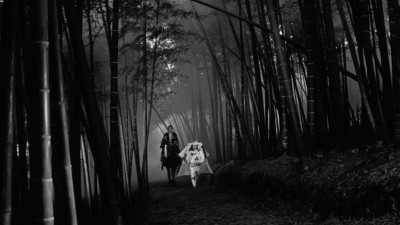KURONEKO (YABU NO NAKA NO KURONEKO) (BLACK CAT)
(director/writer: Kanedo Shinto; cinematographer: Kiyomi Kuroda; editor: Hisao Enoki; music: Hikaru Hayashi; cast: Kei Sato (Raiko), Kichiemon Nakamura (Gintoki-Hachi), Nobuko Otowa (Yone-Mother), Kiwako Taichi (Shige-Daughter-in-law), Hideo Kanze (the Mikado); Runtime: 99; MPAA Rating: NR; producer: Nichiei Shinsha; Toho Company/The Criterion Collection; 1968-Japan-in Japanese with English subtitles)-B/W
“Gorgeously stylized supernatural folktale revenge film.“
Reviewed by Dennis Schwartz
The prolific Japanese filmmaker Kanedo Shinto (“The Naked Island”/”Onibaba”), a socialist whose parents were wealthy, directs and writes this gorgeously stylized supernatural folktale revenge film, set in the 12th century, during feudal times. The ghost story is shot in a beautifully lustrous black-and-white, and the story is told from the POV of the defenseless peasants caught up in the war-torn civil war Heian period (794-1185). Though arguably not as great a film as his innovative Onibaba, it’s still a celebrated classical Japanese ghost story film and one I immensely enjoyed.
In a remote part of Japan, about 17 samurai mercenaries led by Raiko Minamoto (Kei Satô) hide in the bamboo grove and storm the isolated farm home of the peasants, the middle-aged Yone (Nobuko Otowa) and her daughter, Shigei (Kiwako Taichi). They steal their food and eat it like savages, and then gang-rape and murder the pair of helpless women. Before leaving, the samurais burn down the house with the women tied-up inside. The family black cat discovers their bodies and licks them, and will mysteriously take the human form of the women to dispense supernatural justice to the samurais as ghosts.
The older woman’s son Hachi (Kichiemon Nakamura), the farmer husband of the younger woman, has been forced into the army to fight for the emperor, which explains why there was no man home.
We next see the women as ghosts three years later at night, in the woods, at the Rajoman Gate, after they have taken a vow to the underworld god to drink the blood of all samurai. The women ghosts await on the trail in the woods the samurais returning from the battlefields after fighting for the corrupt emperor.The samurai soldiers are on horse as they come by one at a time, whereby they are lured by the beautiful younger woman to accompany them to their illusionary home in a nearby bamboo grove. After inviting the soldier in and getting them to talk about themselves and getting them drunk and sexually excited, the young one suddenly rips out their throat and after their death the appealing house turns back to resembling the charred house of the ghosts.
Hachi returns home after he kills the feared enemy general and brings the severed head to show the governor, Raiko (Kei Sato). He lies that he fought the general under the name Gintoki, and for his heroic deed is made a samurai.
Raikō orders Gintoki to find and destroy the ghosts who are killing the samurai. When Gintoki encounters the two missing women in his life he quickly realizes that they are the ghosts of his mother and wife. Since he became a samurai, the ghosts according to their pact must kill him. But things get worked out through trickery, as Gintoki must undergo a spiritual purification and a final battle.
The film is eerie and unsettling, even if not that scary and a bit too classy for its own good. Nevertheless it seamlessly mixes together realism and fantasy, while heavily influenced by traditional Japanese theater and dance (The soundtrack of drums banging and scraping adds much to the already eye-catching chilly atmosphere). But its breathtaking visuals elevate it to the heights of Japanese cinema despite its narrative, perhaps, not being as lyrically pronounced as some other top-flight ghost story films.

REVIEWED ON 10/24/2019 GRADE: A-
https://dennisschwartzreviews.com/